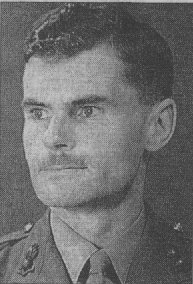 Brinsmead biographies
Brinsmead biographies
The English
- Alfred Ernest Brinsmead
- Alfred Charles Brinsmead
- Rev. Keith Brinsmead
- William Heath Robinson
- Ephraim and Emma Squire
- John (Jack) Brinsmead Squire
- Rosa May Billinghurst
The Canadians
The Americans
The Australians
Rev. Keith Brinsmead
THE DAILY TELEGRAPH
−SATURDAY, JANUARY 22, 1994
THE REV. KEITH
BRINSMEAD, who has died aged 87, was awarded a DSO in September 1943 at Salerno,
where he commanded a battalion of Royal Engineers in the assault.
 While the battle was in progress, and there was a chance that the Allies
might not be able to consolidate their landing, Brinsmead was astonished
to be approached by the mayor and council of Salerno, who insisted on
surrendering the town and port to him. Brinsmead protested that, as a
major, he was hardly the right man to accept responsibility for some
150,000 people, but his arguments were to no avail.
While the battle was in progress, and there was a chance that the Allies
might not be able to consolidate their landing, Brinsmead was astonished
to be approached by the mayor and council of Salerno, who insisted on
surrendering the town and port to him. Brinsmead protested that, as a
major, he was hardly the right man to accept responsibility for some
150,000 people, but his arguments were to no avail.
A year earlier he had been mentioned in dispatches when commanding 573 Field Company Royal Engineers in the battle of Alamein. His unit was
required to clear a 16-yard-wide gap in the German minefields so that
tanks and infantry could pass through.
The Germans, aware that a British attack was impending, had buried a
variety of mines in front of their positions. The sappers crawled
forward in the dark, hoping that the moon would not betray them to the
German snipers, and then delicately poked in the sand until the mines could be lifted out.
Underneath some of the
mines others were
buried, primed to explode when the upper ones were
disturbed.
Lifting them out required
nerves of steel,
sensitivity of touch and considerable technical knowledge. The
cleared path was marked by
white tapes and shaded
lights.
Periodically the whole area
was swept by enemy
fire, killing the sappers
and destroying the
markers. At the height of the
barrage one
of Brinsmead’s men
crawled
up to him and said:
“I hope it
doesn’t thunder,
sir, or I’ll be
really
frightened.” Brinsmead recalled it did
wonders
for his morale. The
team finished their task
ahead of
schedule.
Keith Brinsmead was born
on May 3 1906, into
a well-known piano-making
family,
and after education
at Uppingham and
Imperial College qualified as
a civil engineer. He then
worked for the railways on
bridge- making projects. A Territorial since 1930, he
was called up into the Royal
Engineers in 1939 and then
fought in North Africa and
Italy.
After the war he returned to civil
engineering, working for what had become
the nationalised
railways, and took a prominent
part in fighting the floods
in East Anglia in 1953.
In 1978, at the invitation of the Bishop of
Salisbury, he was ordained; he
ministered to the parishes of Ebbesbourne Wake, Fifield Brabant and Alvediston,
in Chalke Valley.
He married, in 1940, Nance Golden, who died in
1990; they had one
daughter.